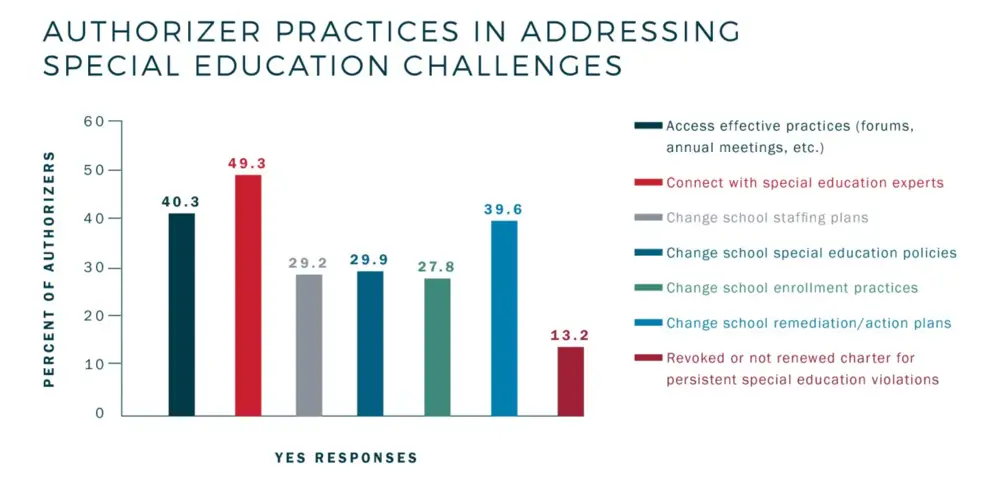Authorizers have an essential role to play in ensuring that charter schools follow all special education laws and produce great results for children with disabilities. For that reason, I found some of the National Association of Charter School Authorizer’s recent survey results on charter school special education oversight pretty depressing and even alarming. The most worrisome areas:
- Nearly 20 percent of authorizers don’t even collect or monitor special education enrollment data.
- Even more (37 percent) don’t report those numbers.
- Half don’t report student outcomes for students with disabilities.
- Only 13 percent say they would close a school for persistent special education violations.
- Just over 25 percent say they would be willing to require a school to change its staffing, policies, or practices in order to address special education challenges.

So it seems that authorizers are generally unwilling to close a school that is failing to comply with federal or state law, but they are also unwilling to require the school to make changes to its special education program, presumably because the authorizers see this as infringement on charter autonomy.
Too many authorizers also seem unwilling to tackle low-hanging fruit that would clearly not be infringement. For example: requiring schools to simply describe their marketing/outreach plans for students with disabilities in an application (only a quarter of authorizers surveyed currently do this).
NACSA asked a lot of questions about setting and enforcing quotas (for example, requiring schools to enroll students with disabilities at the same rates as other schools in the district or state). Authorizers surveyed generally (nearly 75 percent) believe that charter schools should enroll students with disabilities at rates that are representative of the community, but only half believe that authorizers should enforce proportionate enrollment. On its face this may seem problematic, but the reasons to be dubious about enrollment quotas are legitimate and well documented.
That said, authorizers have other avenues for ensuring representativeness of the community and responsiveness to the community’s needs that do not infringe on charter autonomy. As Massachusetts has done, authorizers can focus on level of effort, tracking recruitment and marketing strategies to make sure charter schools are known to families and open and welcoming to students with special needs.
Authorizers can also act to enforce open admissions by:
- Assessing a school’s understanding of the laws in the application process.
- Following up on reports/complaints to make sure schools are not dissuading students with disabilities from applying.
- Employing a secret shopper program or other audits to prevent this practice or catch schools in the act.
- Making sure that school application and enrollment materials don’t inappropriately screen for IEP status.
These are all far more effective avenues for authorizers to pursue in the name of equity than quotas, and I hope future NACSA surveys will ask about actions like this as well as uncover new, promising oversight strategies on special education. In the meantime, there is obviously much work ahead for NACSA, for disability advocates, and for leaders in the charter community to make sure that authorizers do their part in promoting transparency, equal access, and effectiveness when it comes to charter schools and special education.
A version of this blog was first published on the National Association of Charter School Authorizers website.



